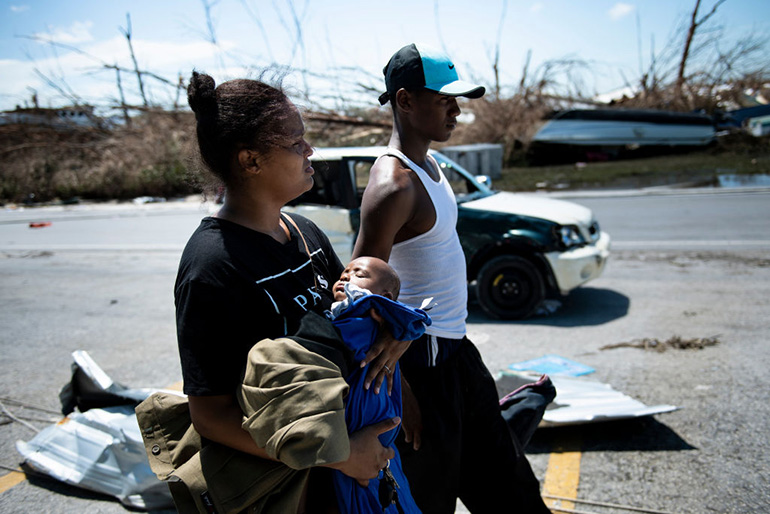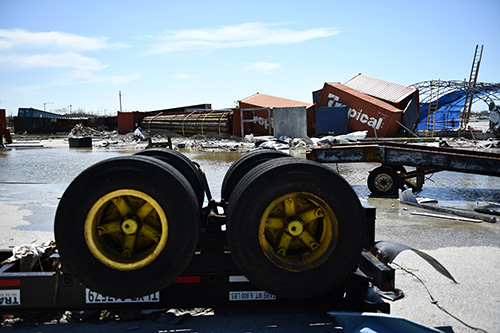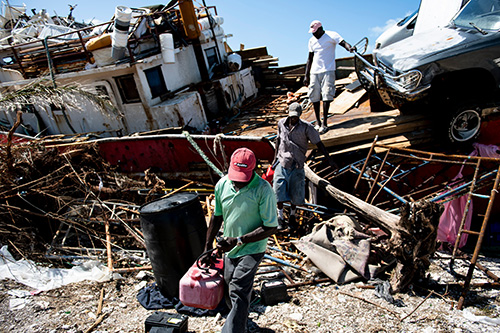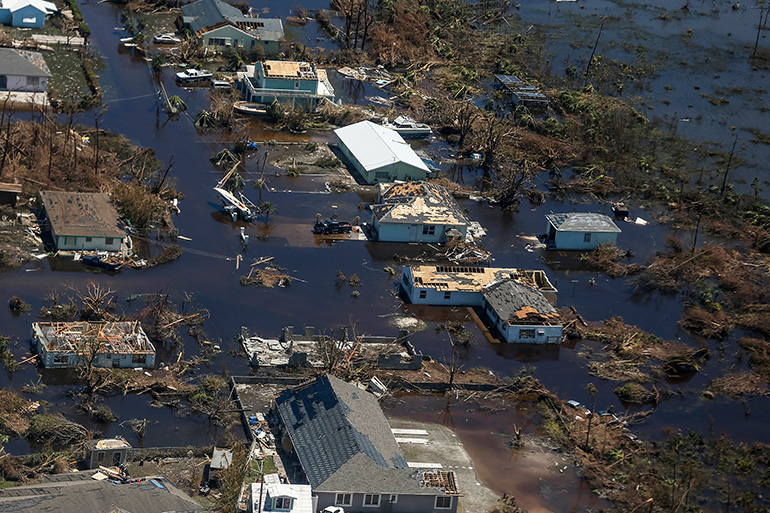By Tom Tracy - Florida Catholic

Photographer: BRENDAN SMIALOWSKI |AFP/Getty Images
Isabel Strachan, left, walks with her son Nathiel Strachan and brother-in-law Kyreem Jonassaind after Hurricane Dorian Sept. 5, 2019, in Marsh Harbor, Great Abaco. Hurricane Dorian lashed the Carolinas with driving rain and fierce winds as it neared the US east coast Thursday after devastating the Bahamas and killing at least 20 people.
MIAMI | An attorney in the Bahamas said by phone Sept. 5 that he fears Hurricane Dorian has devastated the undocumented Haitian immigrant communities in the northern Bahamas.
Geoffrey Farquharson, who practices law in Nassau and graduated from St. Augustine’s College, a high school there, said that two settlements of Haitians in Great Abaco Island’s Marsh Harbor area, locally called “Pigeon Peas” and “The Mud,” were washed away completely by the monster hurricane.
“Those settlements were built illegally on waste ground because nobody had good use for that land and when the hurricane came it was obliterated — many there were completely off-the-grid persons living in the shadows with no passport or papers,” Farquharson said.
He said that the Bahamian government’s estimated death toll is likely to rise when members of this community are accounted for, as search and rescue operations begin in earnest. Yesterday, the official Hurricane Dorian death toll in the Bahamas was 20 but Farquharson believes the number will probably approach double or triple that, conservatively.

Photographer: BRENDAN SMIALOWSKI | AFP/Getty Images
The wheels of a damaged truck lie upside down following Hurricane Dorian Sept. 5, 2019, in Marsh Harbor, Great Abaco.
“The authorities are restrained by some protocols, one of which is notification of next of kin, and when these people die it is much more difficult to identify them. They don’t want people to find out from television that family members who lived in those two Haitian immigration settlements may have died,” said Farquharson, who is a member of St. Francis Xavier Parish in Nassau.
He said the Church and charitable agencies could play a vital role during hurricane recovery by looking after undocumented Haitians and other persons living in the Bahamas who are now likely homeless and fearful due to their situation.
“What I am particularly worried about is that the attitude here toward them has been hardening in recent years and we will have to do something in our church to meet the persons in that community and invite them to come get aid anonymously and with security.”
Farquharson, who rode out the storm at his home in Nassau, said he has spotty cell phone and electrical power — two conditions that existed throughout the Bahamas even before Hurricane Dorian — and that he has watched the news and seen the destruction in the northern Bahamas.
He also has been in touch with clients and colleagues throughout the area and believes that the government’s estimate of 75,000 persons in Grand Bahama and Abacos needing immediate support of food, water and shelter is a highly conservative figure.
NEEDED: 100,000 TRAILERS
“These are destitute hurricane refugees with no stoves, no homes, no groceries and no means of providing for themselves,” Farquharson said. “The most critical need at the moment is water purification pellets and purification machinery. After that, the most urgent need is for food on an ongoing basis and temporary shelter for about a year: maybe a hundred thousand trailers or something similar. I know some have taken shipping containers and made them into shelters. After water the problem is where are these people going to be put?”

Photographer: BRENDAN SMIALOWSKI | AFP/Getty Images
People recover items from a beached boat after Hurricane Dorian Sept. 5, 2019, in Marsh Harbor, Great Abaco.
Many residents of northern Bahamas, he said, appear to have temporarily moved into the one or two sturdier homes on their block which didn’t wash away after Hurricane Dorian — a scene that he says has been reinforced by television news reports throughout the region.
“The Bahamas will be working on this for a long time and when I die they will still be working on repairing the area. It will be a generational operation — there is no way to describe to someone what it is like to lose 20,000 to 30,000 homes,” he said, noting that the compounding problem of mold means that even homes that are still standing may have to be demolished and rebuilt.
“In the meantime, where are we going to put all those people, what about the schools? We will not be able to deal with this on our own and will require a sacrifice of love from the world.”
Farquharson said he is hoping the state of Florida and the U.S. government will move quickly to send over their stockpile of unused hurricane response assets now that Hurricane Dorian has cleared the area. He thinks so-called Roll-on/roll-off (RORO or ro-ro) ships which can unload supplies without a port are urgently needed to deliver staff and machines to clear the airports and create temporary shelters, field kitchens and aid distribution sites.
Meanwhile, communication with the impacted areas is almost nonexistent. Farquharson said he received a phone call during the storm from a client living in southern Abacos who was trying to load his elderly father onto a dump truck and drive him to a hurricane shelter with medical staff during the storm.
'UNDER AN F-5-RATED TORNADO FOR A DAY'
“Then I didn’t hear from him anymore,” Farquharson said, adding that in Grand Bahama and Abaco Islands the experience of Dorian would have been like being under an F5-rated tornado for a day or a day-and-a-half. “Do you know what a town would look like if that happened?”
The National Hurricane Center describes Dorian as one of the strongest storms in Atlantic history, with sustained winds maxing out at 185 mph on Sunday. Compounding the damage, its forward motion slowed to a crawl of one mile per hour as it moved across the northern Bahamas.
Farquharson said that since observing Hurricane Katrina’s impact on New Orleans he has been dedicated to praying to Our Lady of Prompt Succor for his own storm protection and did so throughout Hurricane Dorian.
He said he was just finishing a vacation in the U.S. where he attended the annual convention of the Knights of Columbus in Minneapolis. He started hearing about the approaching storm while in Miami for a few days before returning to Nassau.
“I really believe in prayer, and I pray to her in times of devastation for urgent help,” Farquharson said. “It is a prayer that I have been praying since this hurricane came and I ask people to pray that prayer for us.”

Photographer: ADAM DELGIUDICE | AFP/Getty Images
An aerial view of floods and damages from Hurricane Dorian on Freeport, Grand Bahama on Sept. 5, 2019.

